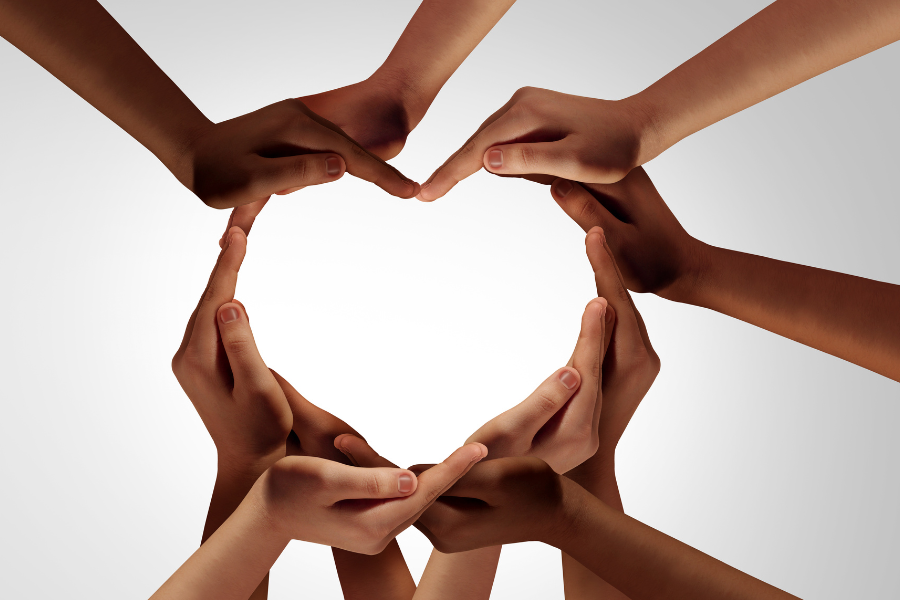Hair Loss and Mental Health: Understanding Roots and Nurturing Resilience

Women love to talk until it’s time to talk about hair loss. It's a topic we often keep to ourselves, yet its impact on our feelings and self-esteem is profound. Let’s keep it real: when we start finding more hair tangled in our brushes than we're used to, it feels as if our bodies are signaling they're inching closer to shutting down entirely. But the end isn’t always near, so the purpose of this blog is to gently peel back the layers of why hair loss happens. From the food we eat and the air we breathe to the stress we keep bottled up—all of these can take a toll on our hair. Let's discuss it openly and without judgment because you're not alone.
Unraveling the Roots of Hair Loss
Diet and Nutritional Deficiencies
Our new understanding (or NU Standard) of hair wellness highlights internal health as the main driver for a healthy head of hair. So when we find our hair shedding more than usual, the first question is, what is going on internally? Because if we are genuinely concerned about the output, we must examine the input.
And we get it. Not every neighborhood has healthy food options, not every home has space for an indoor or outdoor garden, and not every human has housing to store or freeze more nutritious food options. But when we eat foods lacking essential vitamins, minerals, and good bacteria, our bodies develop deficiencies that lead to poor gut health, inflammation throughout the body, and chemical imbalances in the brain. Given enough time, consistent poor gut health and inflammation can lead to autoimmune disorders, various cancers, and depression. And what’s worse? Many of the treatments and medications for autoimmune disorders and cancer can also cause hair loss.
While diet is often the cause, diet can also be the cure. If you live in a food desert with limited access to fruits and vegetables, check in with others in your community about developing a community garden plot. For some, this may already exist. Head to your local library and search for books on foraging in your area–the goal is to consume more plants, many of which are growing as weeds around your city. If you have a bright, southern-facing window, you can grow vegetables indoors successfully. And if you can receive mail, countless delivery options are available for fresh produce boxes and healthy meal kits.
{But if those options don’t work for you, there’s always our favorite nourishing supplement to help keep you on track}
Environmental Factors
It’s bad enough that so many neighborhoods nationwide lack access to healthy food, but now they lack clean water and air. Microplastics are everywhere, and living near industrial zones or pollution-heavy areas might cause our immune system to mistakenly attack our hair follicles, as if we needed more things to stress about. Even studies show consistent exposure to toxic chemicals and pollution leads to autoimmune diseases that can manifest in something as personal as hair loss. But this serves as an urgent reminder to always care for our surroundings, not just for the earth's sake but for protecting and nurturing our own health and well-being.
Economic and Access Barriers
Economic challenges and restricted access to healthcare also form a daunting barrier for countless individuals grappling with hair loss. While it starts as an inability to afford or access treatment, it ends up spiraling into a relentless cycle where financial strain fuels stress, aggravating mental health conditions, which can, in turn, exacerbate hair loss. The psychological toll of witnessing one's hair thinning or receding without the means to seek help just deepens feelings of helplessness and anxiety, and the cycle of stress and hair loss continues.
Beauty Standards and Societal Treatment
You know the worst part of all? While we can all experience hair loss, society's response to hair loss starkly varies between genders. Men who experience baldness get far less societal backlash, as a shaved head or bald look can be perceived as a style choice or linked to maturity and wisdom.
On the other hand, women facing hair loss encounter a much harsher reality. Thinning hair and receding hairlines don’t align well with our current beauty standards, so we conceal our condition using wigs, weaves, or other hair coverings while sometimes forgetting to acknowledge the root of the issue. Trying to keep up with society’s beauty standards can add unnecessary stress, so to those of us on hair journeys who have experienced a period of drastic change, remember you are loved and valued despite the amount of hair on your head.
All That Cortisol
A common theme here is STRESS. High stress levels can directly impact the health of your hair. When your body releases too much cortisol (the stress hormone), it can trigger a condition known as telogen effluvium, where hair shifts faster than usual from its growing phase into the resting phase, leading to increased shedding and thinning. Moreover, stress can worsen other scalp conditions, such as psoriasis or seborrheic dermatitis, further contributing to hair loss.
Adopting stress-reduction techniques such as regular exercise, meditation, deep breathing exercises, or engaging in hobbies can lower your stress levels, potentially reducing the severity and incidence of hair loss. However, we still encourage seeking professional help through various forms of therapy or counseling to find effective coping strategies for stress. The goal is always to find ways to promote a healthier environment for hair growth and overall well-being.
Nurturing Resilience
The emotional toll of hair loss can be devastating, affecting self-image, confidence, and social interactions. Being vulnerable and sharing your stories of resilience and struggle can help demystify and normalize these feelings, offering solace to the millions of others also walking this path. Acknowledging these emotions as valid and deserving of attention and care is crucial. It’s ok to lose your hair. It’s ok to talk about losing your hair. And it's ok to want to seek out healthier choices and surroundings to minimize hair loss and reduce the stress of it all.
Finding ways to cope with the mental health challenges of hair loss involves both seeking professional help and building a supportive community. At least, that is what we hope to achieve as a brand. We hope to foster a community that encourages self-acceptance and radical self-love. We aim to empower our community through knowledge of wellness practices to reduce stress overall and help busy Queens everywhere reclaim their sense of self to navigate their hair wellness journey with dignity. You are not alone, and you never were.



